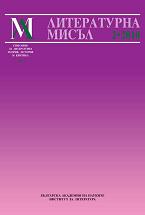Два етюда за „Мила Родино”
Two Essays on "Mila Rodino" (“Dear Motherland”)
Author(s): Grigor GrigorovSubject(s): Anthropology
Published by: Институт за литература - БАН
Keywords: Bulgarian state anthem; "Mila Rodino" (“Dear Motherland”)
Summary/Abstract: The article closely investigates the history of writing and re-writing, understanding and re-understanding of the song “Mila Rodino“ (“Dear Motherland”) from the end of 19th century to 1964, when it was officially declared the Bulgarian state anthem. The paper comprises two essays. The first essay collects many imagined memories of the spontaneous creation of the song by Tzvetan Radoslavov who came back in Bulgaria to take part in the Serbian-Bulgarian War. The assumption is that the myth of spontaneous creation is attached only to songs that contain heroic declaration. This is external to the song. However, it influences its understanding – it seems that at the end of 19th century "Dear Motherland" was read as a song about a man who is returning home, while the geographical space in the first stanza was interpreted as a panoramic “photography” of the motherland, viewed from Vidin. The text versions of ”Dear Motherland“ in secondary school music textbooks suggest that during the Balkan wars the song was re-used by Bulgarian nationalism: the melody wasturned into a march; the text was rewritten in such a way that the mentioned geographical areas had to be unequivocally understood as a map of Bulgarian ethnic territory; in some of the versions “abstracts” of the sacred Bulgarian history appear. The second essay is dedicated to the version of the song, rewritten by Georgi Dzhagarov and Dimitar Metodiev, which was declared the state anthem in 1964. This version of the text keeps the reading of the song as an ethnic map: the geographical spaces of ”Stara Planina“, ”Danube“ and ”Pirin‘ mark the three eternal political areas of Bulgaria (Thrace, Moesia and Macedonia), according to the national myth. At the same time this version is discreetly bound to communist ideology: the assumption is that the interventions in the text are influenced by the model of song “Septemvriytsi", written by the guerilla fighter Hristo Karpachev.
Journal: Литературна мисъл
- Issue Year: 2010
- Issue No: 2
- Page Range: 90-119
- Page Count: 29
- Language: Bulgarian

